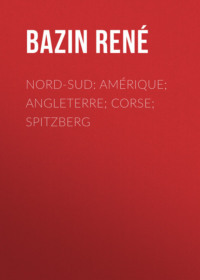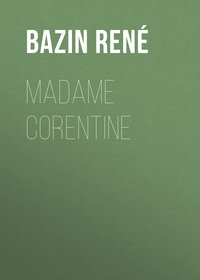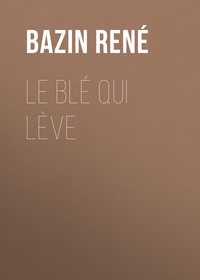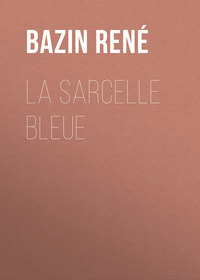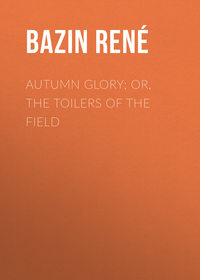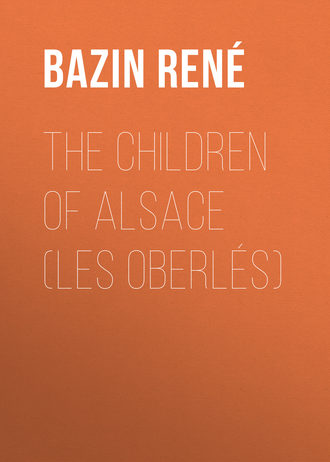 полная версия
полная версияThe Children of Alsace (Les Oberlés)
"Such an old one."
"I cling to it, my friend; it belonged to my great uncle, General Biehler. It saw the back of the Prussians at Jena!"
Half an hour later, in the meadow on the slope in front of the house was M. Ulrich, gaitered like Jean, with a soft hat, the telescope slung over his shoulder, his dog gambolling round him; old Pierre very dignified and solemn, carrying on his mountaineer's shoulders a great pack wrapped in linen and fastened by straps; then Jean Oberlé, bending over a staff-officer's map, which the others knew by heart, discussing the two ways to go – the way of the baggage and the way of the walkers. The discussion was short. The servant went on in front, bearing to the left to reach the village where they would sleep, while the uncle and nephew took a path to the middle of the mountain – in a north-easterly direction.
"So much the better that it is a long way," said M. Ulrich, when they gained the shade of the wood. "So much the better. I wish it were for a lifetime. Two people who understand one another and go through the forest – what a dream!"
He half shut his eyes, as painters do, and breathed in the mist with pleasure.
"Do you know," he added, in the way he would have confided to him something delightful, "Do you know that we have had spring here for three days? There it is – that's my second reason!"
The forester said with enthusiasm what the manufacturer had said without admiration. By the same signs he recognised that a new season had begun. With his stick he pointed out to Jean the pine buds, red like arbutus berries; the bursting bark on the beech trunks, the shoots of wild strawberries running along the stones. In the uncovered pathways the north wind still blew, but in the hollows, the combes, the sheltered spots, one felt, in spite of the fog, the first warmth of the sun, which goes to the heart and makes men tremble, that warmth which touches the germ of the plants.
That day, and during those which followed, uncle and nephew lived under wood. They understood one another perfectly, whether they spoke fully on any subject or were silent. M. Ulrich knew the forest and the mountains by heart. He enjoyed this opportunity which had been given him to explain the Vosges and to discover his nephew. Jean's ardent youthfulness often amused him and recalled bygone times. The instincts of the forester and hunter, slumbering in the young man's heart, were ripening and strengthening. But he had also his rage, his revolts, his juvenile threatening words, against which the uncle protested but feebly, because he really approved of them.
The plaint of Alsace rose to his ear for the first time, the complaining cry the stranger does not hear and the conqueror only half listens to, but can never understand. For Jean did not only observe the forest; he also observed the people of the forest, from the merchants and the officials, feudal lords on whom depend a multitude almost past numbering, down to woodcutters, jobbers, fellers, carters, charcoal burners, down even to wanderers, shepherds, and swineherds, pedlars of dead wood, freebooters, poachers, myrtle gatherers, who also gather mushrooms and wild strawberries and raspberries.
Introduced by Uncle Ulrich, or passing by in his shadow, he aroused no suspicions.
He talked freely with the people – in their words, their silence, and in the atmosphere in which he lived day and night, he absorbed unto himself the very soul of his race. Many did not know France, among the young ones, and could not have said if they loved her, but even those had France in their veins. They did not get on with the German. A gesture, a look, an allusion, showed the secret disdain of the Alsatian peasant for his conqueror. The idea of a yoke was everywhere, and everywhere there was antipathy against the master who only knew how to govern by fear. Other young men of the families with traditions, instructed by their parents in the history of the past, faithful without any precise hope, complained that the poor of the mountain and plain were denied justice and subjected to annoyances if they were suspected of the crime of regretting France. They spoke of the tricks played by way of revenge on the custom officers, on the police, on the forest guard – proud of their green uniform and of their Tyrolese hat – the stories of smuggling and desertion, of the Marseillaise sung in the taverns with closed doors, of fêtes on French land, of perquisitions, domiciliary visits and pursuits, of the comic or tragic duel, useless and exasperating, between the strength of a great country and the mind of a small one. When the latter suffered, its thoughts, inherited from ancestors, through habit and from affection, went over the mountains.
There were also the old folk, and it was M. Ulrich's delight to make them talk. When on the roads, and in the villages, he saw a man of fifty years or more, and he knew him to be an Alsatian, it was seldom that he himself was not recognised and that a mysterious smile did not prepare the question for the Master of Heidenbruch:
"Come, is this not another friend – a child of our family?"
If M. Ulrich, by the expression of the face, by the movement of the eyes, by a little fear sometimes, felt that his conclusion was justified, he added in a low voice:
"You – you have the face of a French soldier!"
Then there were smiles or tears, sudden shocks to the heart, which changed the expression of the face pallors, flushings, pipes taken from the corner of the lips, and often, very often, a hand raised, turned palm outwards, touching the brim of the felt hat, thus making the military salute, as long as the two travellers were in sight.
"Do you see him?" said Uncle Ulrich, quite softly; "if he had a bugle he would play 'La Casquette.'"
Jean Oberlé never ceased talking of France. He asked when he came to the top of a mountain ridge: "Are we far from the frontier?" He made the uncle tell him what Alsace was like under the "gentle rule" – what liberty was enjoyed by each and all, how the towns were administered? What difference was there between the French gendarmes – whom M. Ulrich mentioned with a friendly smile as good fellows, not too hard on the poor – and these German gendarmes, common informers, brutal, always officious and full of zeal, whom the whole of the Alsace of to-day hated? What was the name of that prefect of the First Empire who placed by the roadsides of Lower Alsace benches of stone of two tiers so that the women going to market could sit down, and place at the same time their load above them? "The marquis de Lezay Marnésia, my boy."
"Tell me the story of our artists, of our deputies in the old days, of our bishops. Tell me what Strasburg was like in your youth, and what a sight it was when the military band played at Contades?"
M. Ulrich, with the joy of living over again which mingles with all our memories, remembered and related. While climbing and descending the intersections of the Vosges he went through the history of French Alsace. He had only to let his ardent heart speak, and it made him weep. It also made him sing, with the gaiety of a child, the songs of Nadaud, of Béranger, La Marseillaise, or the old Noels, which he sang to the pointed arches of the forest.
Jean took such a passionate interest in these evocations of old Alsace, and he so naturally entered into the hatreds and revolts of the present that his uncle, who was at first pleased at it as a sign of good family, ended by growing uneasy. One evening, when they had given alms to an old teacher, deprived of the right of teaching French, and reduced to misery because she was too old to get a German diploma, Jean's anger had carried him away.
"My dear Jean," said the uncle, "you must be careful not to go too far. You have to live with Germans."
Since then M. Ulrich had avoided returning so often to the question of the annexation. But alas! it was the whole of Alsace, it was the landscape, the descending road, the sign of some shop, the women's dress, the type of men, the sight of soldiers, the fortifications at the top of a hill, a finger-post, the different items in a newspaper bought in the Alsatian inn where they had dined in the evening – it was every hour of the day which called their minds back to the condition of Alsace, a nation conquered but not assimilated. In vain did M. Ulrich answer more carelessly and quickly – he could not hinder Jean's thought from travelling the road to the unknown. And when they climbed together a neck of the Vosges, the elder man saw with pleasure and apprehension Jean's eyes travel to seek the horizon on the west, and gaze there as at some loved face. Jean did not look so long at the east or the south.
A fortnight was employed in visiting the forest of the Vosges, and during this time M. Ulrich came back to Heidenbruch only twice for some hours. The separation took place only on Palm Sunday, in a village of the Valley of Münster.
It was evening – the hour when the valleys of the German side of the mountains were quite blue, and there was only a strip of light on the last pines which surrounded the shade. M. Ulrich Biehler had already said good-bye to this nephew, his dearest friend.
The servant had taken the train that same morning for Obernai, M. Ulrich, the collar of his cloak turned up because the cold was piercing, had just whistled to Fidèle and was leaving the inn, when Jean, in his blue hunting-costume, without a hat, came down the flight of steps.
"Again good-bye," he said.
And as the uncle, very upset, and not wishing to show it, made a sign with his hand to avoid words which might be tremulous —
"I will go with you to the last house of the village," continued Jean.
"Why, my boy, it is useless to prolong – "
His head turned towards his uncle, and his uncle, looking down the road, Jean began to walk. He commenced in his cajoling young voice:
"I am inexpressibly sorry to leave you, Uncle Ulrich, and I must tell you why. You understand before one says twenty words. You do not contradict aggressively: when you are not of my opinion, I know it by your mouth, which makes the point of your white beard rise – that is all. You are kind. You do not get angry, and I feel you are very decided. Other people's ideas all seem familiar to you – you are able to answer them so easily; you are respected by the weak. I was not accustomed to that on the other side of the Rhine."
"Bah! bah!"
"I even appreciate your fears about me."
"My fears?"
"Yes. Do you think that I did not see that there is another question which interests me intensely, and of which you have not spoken to me for six days?"
This time Jean did not see his uncle's profile; he saw his full face, and its expression was a little anxious.
"My boy, I did that purposely," said M. Ulrich. "When you questioned me, I told you what we were and what we are. And then I saw that I must not insist too much, because you would be full of grief. You see, grief is good for me; but for you, youth, it is better that you should start off like the horses which have not yet run a race, and only carry a very slight weight."
The last house was passed. They were in the country, between a stream strewn with many boulders, and a steep slope which joined the forest up above.
"Too late," said Jean Oberlé, holding out his hand and stopping, "too late; you have said too much, Uncle Ulrich. I feel I belong to the older times, as you do. And so much the worse, as to-morrow I go up to the Schlucht. I shall see her – I shall say good day to our country of France!"
He laughed as he uttered these words. M. Ulrich shook his head once or twice to scold him, but without answering, and he went away into the mist.
CHAPTER VI
THE FRONTIER
The next day Jean started in the morning on foot to go to the cutting bought by the House of Oberlé, which was situated on the crest of the mountains, enclosing the valley, to the left of the neck of the Schlucht, in the forest of Stosswihr. The way was long – the soil made slippery by a recent shower; besides, Jean lost several hours in going round a great rock he ought to have climbed. The afternoon was well advanced when he came to a wood cabin at the place where the road ended: just the time to talk to the German foreman who directed, under the supervision of the forest administration, the felling and transport of the firs; and the young man, continuing his climb, passed the workmen from the timber-yard coming down before the end of the day, to regain the valley. The sun, still splendid, was about to disappear on the other side of the Vosges. Jean was thinking with a beating heart of the frontier now quite near; however, he would not ask the way of the men who saluted him in passing, for he prided himself on hiding his emotions, and his words might have betrayed him before this gang of woodcutters released from work, and curious at the meeting. He entered the cutting they had just left. Around him the pine-trees, branchless and despoiled of their bark, were lying on the slopes, which they seemed to light up by the whiteness of their trunks. They had rolled – and stopped – one could not see why. At other times they had made a barrier and placed themselves pell-mell like spilikins on a game board. In the high forest there only remained one workman, an old man dressed in dark clothes who, kneeling, tied up in his handkerchief, a store of mushrooms he had gathered. When he had finished tying the ends of the red stuff with his clumsy fingers he got up, pushed his woollen cap well on to his head, and began to descend, with long strides over the moss, his mouth open to the odour of the forests.
"Ah," said Jean, "one minute, my man."
The man between two immense pine trunks, himself the colour of the bark, turned his head.
"Which is my nearest way to get to the neck of the Schlucht?"
"Go down by the waterfall, the way I go, and then turn up again. But do not go up there another two hundred yards, for then you go down into France; you will find paths which will lead you to the Schlucht. Good evening!"
"Good evening!"
The words rang out, soon lost in the vast silence. But one of them went on speaking to Jean Oberlé's heart: "You will go down into France." He was in a hurry to see her, this mysterious France, which held such a large place in his dreams, in his life – she, who had destroyed the unity of his family because the older members, some of them at least, remained faithful to her charms. France, for whom so many Alsatians had died and for whom so many others were waiting and whom they were loving with that silent love which makes hearts sad. So near him – she from whom he had been so jealously kept – she for whom Uncle Ulrich, M. Bastian, his mother, his grandfather Philippe, and thousands and thousands of others said a prayer every night!
In a few minutes he had reached the top and begun his descent on the other side. But the trees formed a thick curtain round him. And he began to run to find a road and a free space to see France. He took pleasure in sliding down and letting himself almost fall, head foremost, seeking the desired opening. On this side of the mountain the sun was touching the earth; here and there the air was still warm; but the pines always made a wall.
"Halt!" cried a man, showing himself suddenly, and coming out from behind the trunk of a tree. Jean went on running some steps – carried away by the impetus. Then he came back to the customs official who had called to him. Then the man, who was a brigadier, young and squat, with defective eyes, a little wild, two locks of yellow hair framing the thick-set face – the real type of a man of the Vosges, looked at the young man and said:
"Why the devil did you run? I thought you were a smuggler."
"I was trying to find a place to see a landscape in France…"
"Does that interest you? You are from the other side?"
"Yes."
"Not a Prussian all the same?"
"No; an Alsatian."
The man smiled slightly and said, "That is better!"
But Jean continued without taking up the conversation, and as if he had forgotten his question, to look at this poor officer of France, his face, his uniform, and to photograph them on his mind. The officer seemed amused at his curiosity and said, laughing:
"If it is a view you are after, you have only to follow me. I have one which the Government offers me to complete my treatment."
They both began to laugh, looking straight into each other's eyes quickly – less for what the customs officer had said than because of a certain sympathy which they felt for each other.
"We have no time to lose," said the brigadier, "the sun is dying down."
They went on under the vault of pines, turning round a cliff of bare rocks on which were planted at some distance two posts marking the spot where Germany ended and where France began, and at the end point, which was like a spur in the green, on a straight platform, which had its bed down in the forest, they found a watch-house of heavy planks of pines nailed on to the beams. From there one could see an immense landscape, which went on and on, sloping down – as far as human eye could see. In this moment and in the setting sun a pale golden light bathed the terraced lands, forests, villages, and rivers, the lakes of Retournemer and Longemer, softening the reliefs, and casting a colour like that of corn on uncultivated lands covered with heath. Jean remained standing, drinking in the picture to intoxication, and kept silence, while his emotion increased. He felt that the whole depth of his soul was full of joy.
"How beautiful it is!" he said.
The brigadier of customs, who was observing him from the corner of his eye, was flattered by the other's unstinted praise of his native district and answered:
"It is tiring, but in summer it is good to walk – for those who have the time. People come from Gérardmer, and from Saint Dié and Remiremont and from farther still. Many people come from over there – "
Over his shoulder, with his thumb reversed and turned backwards, he pointed to the country beyond the frontier.
Jean was shown in which direction lay the three towns of which the Custom House official had spoken. But he only followed his own thought with attention. What delighted him was the clearness of the air, and the idea of the illimitable, of the sweetness of life and of fertility which came to his mind at the sight of the French land. It was all he knew of France, what he had read, and what he had heard his mother, grandfather, and uncle Ulrich talk about, what he had pictured to himself, memories buried deep in his mind, which rose again suddenly like millions of grains of corn to the call of the sun.
The brigadier was seated on a bench, along the side of the hut; he had taken his short pipe from his pocket and was smoking.
When he saw the visitor turn towards him, his eyes full of tears, and seat himself on the bench, he guessed Jean's feelings; for Jean's admiration of the picturesque had escaped him, but the tears of regret at once made the brigadier grave. Those were from the heart, and a sublime equality united the two men. However, as he did not dare to question he stiffened his neck, until the muscles were visible, and began to study the horizon silently.
"What part of France do you come from?" asked Jean.
"About five leagues from here, in the mountain."
"Have you served your time in the army?"
The brigadier took his pipe from his mouth and his hand quickly touched the medal hanging on his breast.
"Six years," said he – "two furloughs. When I left I was a sergeant, with this medal, which I brought back from Tonquin. A fine time when it is finished." He spoke like travellers who prefer the remembrance of a journey but all the same have not disliked it. And he continued:
"With you, they say it is harder."
"Yes."
"I have always heard it said Germany is a great country, but the officer and the soldier are not relatives as in France."
The sun was going down; the great golden landscape became tawny in places and purple in shadow. This purple spread with the rapidity of racing clouds on shadowed slopes and veiled plains – how Jean Oberlé would have loved to see you again in strong light! He asked:
"Do you ever see any deserters?"
Those who pass the frontier before their service begins are naturally not known, only the soldiers serving in the Alsace-Lorraine regiments and who desert in uniform. "Yes; I have seen several poor fellows who had been too severely punished or whose tempers were too proud. You will say that some desert from our side too, and it is true; but then they are not so many – "
Shaking his head and looking tenderly at the sleeping forests:
"When one belongs to this side, you see, one can speak ill of it, but one is not satisfied elsewhere. You do not know the country, sir, and yet to look at you one would swear you belonged to it."
Jean felt himself getting red; his throat was dry; he could not answer. And the man, thinking that he had taken a liberty, said:
"Excuse me, sir; one never knows whom one meets; and it is better not to talk about these things. I must continue my rounds and go down again."
He was going to salute in military fashion; Jean took his hand and pressed it.
"You are not mistaken, my friend," he said.
Then, feeling in his pocket, he held out his cigar-case to him.
"Come, take a cigar!"
And then, with a kind of childish joy, he emptied his case into the hand which the Custom House official held out.
"Take them all; you will give me pleasure. Do not refuse me!"
It seemed as if he wanted to give something to France.
The brigadier hesitated for a moment, and closed his hand over them, saying:
"I will smoke them on Sunday. Thank you, sir! Good-bye!"
He saluted quickly, and was lost to sight almost immediately in the firs that clothe the mountains. Jean heard his footsteps growing fainter in the distance. Above all, he heard echoing in his soul, and with indescribable emotion, the words of this unknown man.
"You belong to us." "Yes, I belong here; I feel it, I see it; and that explains to me so many things in my life."
The shadow descended.
Jean saw the land darkening. He thought of those of his family who had fought there, round the villages submerged by the night, so that Alsace should remain united to that great country stretched out before him. "Sweet country – my country – every one has tender words for her; and I, why did I come? Why am I as moved as if she were living before me?"
In a little while, on the fringe of the sky just where the blue began, rose the evening star. Alone, faint but dominating as an idea.
Jean rose; the night was becoming quite dark, and he took the path which follows the crest of the hills; but he could not take his eyes from the star. Walking all alone in the deep silence, on the summit of the divided Vosges, he said to the star and to the shadow beneath:
"I belong to you; I am happy to have seen you. It frightens me to love you as I do!"
Soon he reached the frontier, and by the magnificent road crossing the Schlucht, went back again into the German-land.
The following day, the Tuesday of Holy Week, he was again at Alsheim, and handed to his father the report he had drawn up. Every one welcomed his return with such evident pleasure that he was very much touched by it. The evening after the "conference" between the old grandfather and the manufacturer, and at which Jean was present, since he had just returned from visiting the cuttings, Lucienne called her brother to the fire before which she was warming herself in the large yellow drawing-room. Madame Oberlé was reading near the window; her husband had gone out, the coachman having informed him that one of the horses had gone lame.
"Well!" asked Lucienne. "What is the most beautiful thing you saw?"
"You."
"No, do not joke; tell me, the most beautiful thing during your journey?"
"France!"
"Where?"
"At the Schlucht. You cannot imagine the emotion it made me feel. It was a shock – like a revelation. You do not seem to understand me."
She answered in an indifferent manner:
"Yes; I am delighted that you were pleased. It ought to be a very fine excursion at this time of the year. The first spring flowers, are there not? And the breeze in the woods? Ah, my dear boy, there is so much convention in all that!"
Jean did not go on. She it was who continued, and in a confidential voice, which she modulated, and made marvellously musical:


